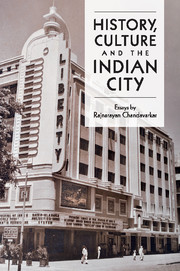Book contents
- Frontmatter
- Contents
- Acknowledgements
- Publisher's note
- Introduction by Dr Jennifer Davis, Wolfson College, University of Cambridge
- Bombay's perennial modernities
- Sewers
- Peasants and proletarians in Bombay city in the late nineteenth and early twentieth centuries
- State and society in colonial India
- Religion and nationalism in India
- From neighbourhood to nation: the rise and fall of the Left in Bombay's Girangaon in the twentieth century
- Historians and the nation
- Urban history and urban anthropology in South Asia
- Aspects of the historiography of labour in India
- Postscript by Professor David Washbrook, Trinity College, University of Cambridge
- Bibliography of the published works of Rajnarayan Chandavarkar
- Index
- References
Introduction by Dr Jennifer Davis, Wolfson College, University of Cambridge
Published online by Cambridge University Press: 17 March 2010
- Frontmatter
- Contents
- Acknowledgements
- Publisher's note
- Introduction by Dr Jennifer Davis, Wolfson College, University of Cambridge
- Bombay's perennial modernities
- Sewers
- Peasants and proletarians in Bombay city in the late nineteenth and early twentieth centuries
- State and society in colonial India
- Religion and nationalism in India
- From neighbourhood to nation: the rise and fall of the Left in Bombay's Girangaon in the twentieth century
- Historians and the nation
- Urban history and urban anthropology in South Asia
- Aspects of the historiography of labour in India
- Postscript by Professor David Washbrook, Trinity College, University of Cambridge
- Bibliography of the published works of Rajnarayan Chandavarkar
- Index
- References
Summary
The originality and the humanity of Rajnarayan Chandavarkar's work, which infuse the essays contained in this volume, may be traced in some measure to his own experience as an Indian in England as well as to the intellectual milieu in which he found himself during his formative undergraduate and postgraduate years in Cambridge. These essays also reflect his enduring love of storytelling.
By all accounts, not least his own, Raj had an idyllic, big-city childhood in Bombay in the 1950s and 1960s. In 1971, he won a British Council scholarship to study for two years at Lancing College. He claimed that, for him, the great attraction of Lancing was that it had a particularly impressive cricket field, was close to the Sussex County Cricket Ground and was in reachable distance of Lords. After Lancing, he spent a further five years as a student at Cambridge University where he obtained a BA and then a PhD. He went on to research fellowships at Trinity College and the Centre for South Asian Studies and then to a lectureship in Indian History.
It was Raj's spirit of adventure (and his love of cricket) that sent him to England. And then the trajectory of a distinguished academic career which kept him there. To understand his work, it is first important to understand that he never intended to leave India for good; and that on his frequent trips to India and to his beloved Bombay he always saw himself as an exile, though by happenstance rather than by choice, coming home.
- Type
- Chapter
- Information
- History, Culture and the Indian City , pp. 1 - 11Publisher: Cambridge University PressPrint publication year: 2009



